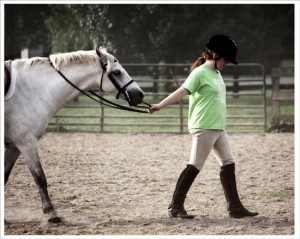 I have said before—and been quoted as saying—that a horse is born with it’s disposition. Good or bad, that horse can only be one way the rest of its life, and any amount of training is merely a slight modification of the true nature of the horse. But I think I have to change that statement slightly by saying that a horse’s disposition is formed at a very early age (not exactly at birth) and once it has formed that initial, instinctive code of conduct, it is set—good or bad—and it’s very difficult to change it completely.
I have said before—and been quoted as saying—that a horse is born with it’s disposition. Good or bad, that horse can only be one way the rest of its life, and any amount of training is merely a slight modification of the true nature of the horse. But I think I have to change that statement slightly by saying that a horse’s disposition is formed at a very early age (not exactly at birth) and once it has formed that initial, instinctive code of conduct, it is set—good or bad—and it’s very difficult to change it completely.
I’ve been thinking on the nature of horses, how they react to their surroundings and herdmates, and form their own individual characteristics based on environment and treatment…it’s very similar to how our own character is formed. Some of the traits are hereditary, passed on through our lineage. But the vast majority is learned at an early age, formed and shaped by circumstances in our lives, moments that make big impressions on us, leaving us set and programmed to be who we are the rest of our lives.
If you’re a horse trainer, you understand this about horses. Horses don’t forget things that have happened to them. They are flight creatures, very sensitive and quick to respond, and it is only a repetition of familiar things that lowers that quickness and dulls that sensitivity. A horse’s breed does play into it (Warmblood, Hotblood, Draft, Quarter Horse, Arabian, etc.), and a general pattern of similarity passed on by the parents, but the true disposition of the horse is programmed and set at a very young age. After that, all we can do with them is attempt to modify that disposition and get the best out of that horse that we possibly can.
A good trainer will credit the horse with the quality of “trying to please”, “working with you”, and being very resilient and forgiving. Horses can overcome harsh treatment in their past and learn to trust again after being harmed, but in my opinion it is only a very good trainer who can get the most from a horse like that, and that horse may carry the scars throughout its life, and those scars may crop up again and again if the horse is put in a situation that reminds him of the harsh treatment in his past. For instance, the horse might be just fine for a certain rider, or in situations he is comfortable with, and then some unknown factor enters in and the horse might freak out. This is why I have to modify my “born disposition” statement…you can’t always guarantee that a seemingly broke horse is going to remain calm, because if something triggers a memory or instinct from the horse’s past, bad things can still happen.
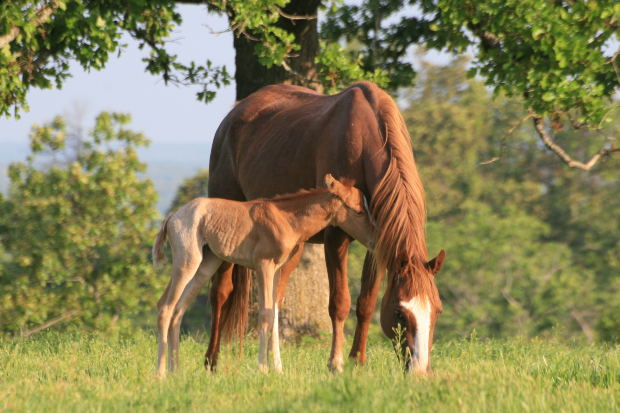 I think the actions of the horse’s mother in the first year or so after birth will dictate how the foal will act. If the mare is laid back, gentle, easy to work with, not flighty…she will pass those characteristics on through learned behavior to her foal. The foal responds to her body language and copies it, so if the mare accepts human handling, it is very likely that foal will always accept it very readily. A foal born in the wild, or without human interaction can still be gentled and trained, but it is going to continually rate its comfort level with humans, based on anything that’s ever happened to it, good or bad.
I think the actions of the horse’s mother in the first year or so after birth will dictate how the foal will act. If the mare is laid back, gentle, easy to work with, not flighty…she will pass those characteristics on through learned behavior to her foal. The foal responds to her body language and copies it, so if the mare accepts human handling, it is very likely that foal will always accept it very readily. A foal born in the wild, or without human interaction can still be gentled and trained, but it is going to continually rate its comfort level with humans, based on anything that’s ever happened to it, good or bad.
I have two mares, Daisy and Penny. I don’t know too much about Penny, having only owned her for a year and a half and being pregnant for half that time so I haven’t been riding, but Daisy I can pretty much account for most of her life. I bought Daisy when she was four, from her original breeder and owner, who is a quiet man with way too many horses to train them all, but he just loves horses so he keeps breeding a few each year and keeping most of them around. I know he valued Daisy’s mother and that she was a good dependable horse, and I know that he taught the foals at an early age to jump in the horse trailer alongside their mothers to go to summer pasture and so on. Other than that, her first four years I don’t know a lot about.
But when I bought Daisy, as an unbroke 4 year old, I put a saddle on her in the round pen and she looked around at me like, “Okay, get on, let’s go.” So I did. She was already “broke”, she was that calm and quiet. I rode her bareback all around the farm, and there was no spook there at all, no danger I could see. As far as gentleness, I had hit the jackpot, she was that quiet.
I rode her a couple of years, off and on, and the only trouble I had with her was occasional balking. She did buck me off once, and several times would stop during a ride, and rear up a little as if warning me that what I was asking of her was just a little too much, she was ready to go back to the barn with her buddies. These tactics I tried to meet with bravado, tightening my seat and reins, holding onto the saddle horn, talking sternly to her and legging her up to get her through that balking point, after which we’d continue our ride. It just left me with a little nagging doubt about her true nature, but I didn’t see all of it until she was under another rider.
When she was six, I took her to a training clinic where a friend of mine was working with people’s horses. He told me to bring Daisy, saying he gets tired of working horses on foot all day, and it would be nice to have a horse to ride. I warned him that she hadn’t been ridden in a year, since I had been pregnant with our oldest child, and I wasn’t sure how she’d behave. He sort of shrugged it off and stepped into the stirrup with a lunge whip in one hand. Daisy broke in half, in a series of high, wild, rodeo-worthy bucks all over that outdoor arena, through a dozen or so other riders and horses! I could not believe my eyes. The trainer stuck with her, never pulling on the reins or responding at all other than to ride it out, and then he stepped down, handed me her reins and said he guessed he’d work on foot.
Well, I was shocked. I didn’t think she had it in her, I had never seen any of that side of her before. But it’s there. So I modified my opinion of her just a tad, and that day I rode her just fine, we worked on backing up, leg yielding, and lowering her head to pressure. I have continued to keep her and ride her for these following seven years, and she has never offered to buck with me, ever since. But I know she can, and I ride her accordingly.
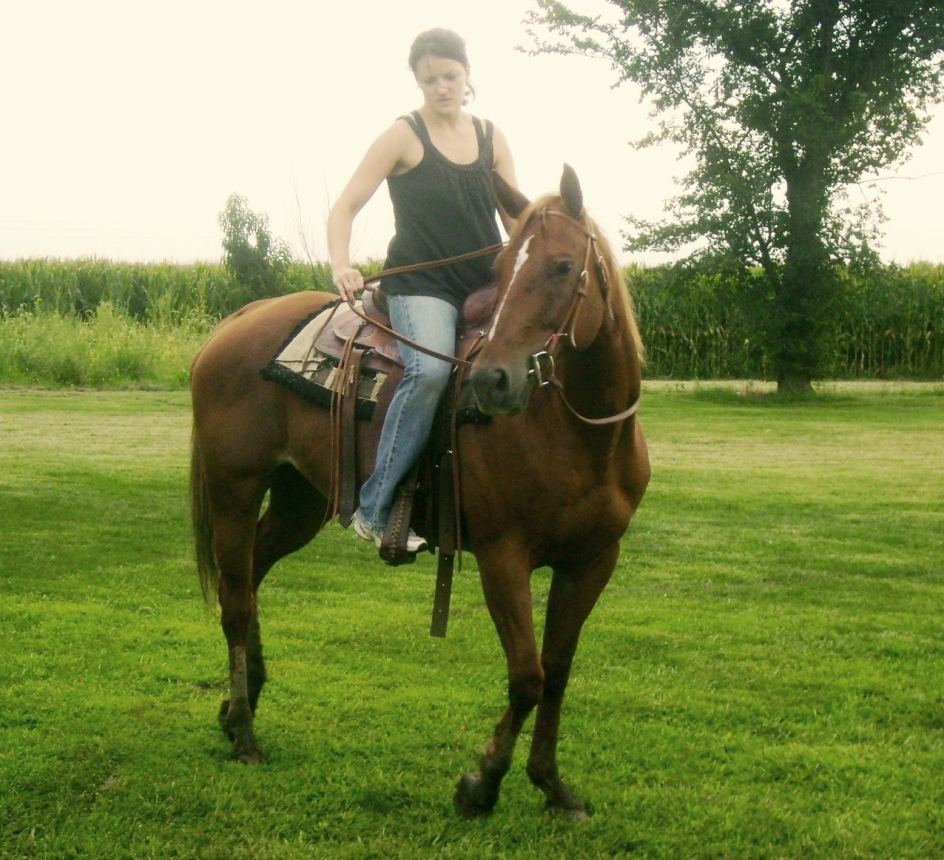 Daisy does have a few other character flaws. She’s bullheaded. I tied her up to trim her hooves when I first bought her and she promptly broke my heavy nylon halter. She’s buddy sour. Her biggest concern is staying within ten yards of her barnmates, and while she will ride out alone, she will offer up constant reminders that she is unhappy being away from them, and I always trust her less if I’m making her ride away from the other horses, because it’s such a big deal with her, she’s not safe if she’s not happy. She’s pushy. I have had her nearly trample me to get out the gate, if the other horses are already out grazing and I’m simply wanting to lead her through to join them. She doesn’t care where you’re at, her one goal is to meet up with friends and eat grass. So….I don’t know how that character was formed, my guess is she was left to her own ways for four years, and that was about three and a half years too long for her to be a good, responsive, trustworthy riding horse. But we get along on what we’ve got.
Daisy does have a few other character flaws. She’s bullheaded. I tied her up to trim her hooves when I first bought her and she promptly broke my heavy nylon halter. She’s buddy sour. Her biggest concern is staying within ten yards of her barnmates, and while she will ride out alone, she will offer up constant reminders that she is unhappy being away from them, and I always trust her less if I’m making her ride away from the other horses, because it’s such a big deal with her, she’s not safe if she’s not happy. She’s pushy. I have had her nearly trample me to get out the gate, if the other horses are already out grazing and I’m simply wanting to lead her through to join them. She doesn’t care where you’re at, her one goal is to meet up with friends and eat grass. So….I don’t know how that character was formed, my guess is she was left to her own ways for four years, and that was about three and a half years too long for her to be a good, responsive, trustworthy riding horse. But we get along on what we’ve got.
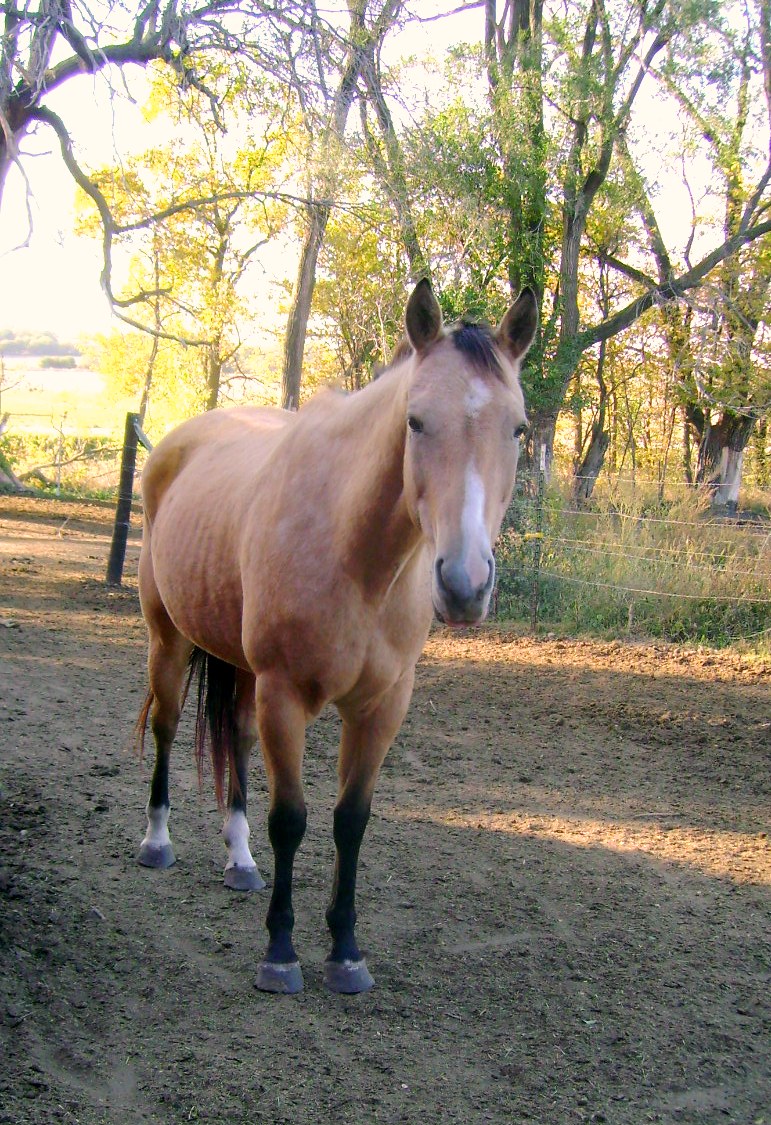 Contrast that with Penny. Penny is my buckskin mare. I don’t know a thing about her, except that she’s eight years old, came with a cute little buckskin baby when we bought her, and I thought she might make a riding horse. From the moment we bought her, she showed all the signs of a good education. Loaded in the trailer, led gently, stands quietly in the halter, shows responsiveness to where you are standing or what you are doing, accepted her feet being trimmed, took the saddle without complaint or edginess, and acted a lady no matter what we asked of her. So I got on her and started riding her. Just like that.
Contrast that with Penny. Penny is my buckskin mare. I don’t know a thing about her, except that she’s eight years old, came with a cute little buckskin baby when we bought her, and I thought she might make a riding horse. From the moment we bought her, she showed all the signs of a good education. Loaded in the trailer, led gently, stands quietly in the halter, shows responsiveness to where you are standing or what you are doing, accepted her feet being trimmed, took the saddle without complaint or edginess, and acted a lady no matter what we asked of her. So I got on her and started riding her. Just like that.
I don’t know where Penny came from, or who worked with her, trained her, or rode her before me. But I like her. She has that kind of disposition that you cannot create in a horse. It’s just there. I have had her crow hop at a lope, just a bit, and she is a little on the hot side. But that’s just one more thing to love about her, in my opinion. And one of the very best things about her is the example she has been to her yearling colt. He is going to be a good horse because of her.
Horses are just like kids. Left to themselves, they will not turn out well. Train them from day one, and you’ve got something really valuable. Remember that when you’re choosing a horse. Disposition is the single most important thing in a horse. Color and beauty is just the outside wrapper, it’s the horse’s heart that you want to fall in love with.
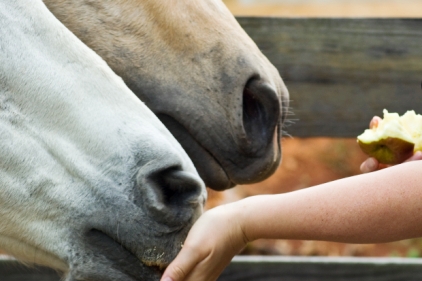

{ 2 comments }
I “think”…haha…from my years of being around my two…that the disposition/nature…just IS. They are born with it, yet it can be modified by experience and humans. Little Girl, a quarter horse, had an aggressive streak when young. Yet never wanted to hurt you…or continue the temper tantrum once you were bucked off. As in, continuing to buck around the corral once you were displaced. At 21, the aggressive streak is still there. She has been treated her whole life with the my attitude of “No, I don’t think she will…but she might” A wonderful horse that will attempt anything you ask of her, but never has 100% of my trust. She is a horse to be ridden…not just sat upon.
Bones…weaned at 3 months, penned alone for months till we got him. Scared, but not. No socialization skills. When he got nervous, he’d turn his butt to you and threaten kicks. Got tired of that and poked him one day with my manure fork. Never did it again. He responds to tone and body language the best. You must gently outwait him with pressure to get what you want, then praise with tone or a pat, and he will just drop his head and relax. Try to “force” and issue…and he will sull up. Frozen in place with a hard jaw, planted feet, and stiff neck. Never, never…offered to hurt a human. He’s done it accidentally, before manners..but he’s always had a disposition I wish I could bottle. Can give an experienced rider a nice ride…or let a 4 year old pull him away from a patch of clover.
He’s crazy crazy buddy sour. Screams and yells…yet absolutely NO trouble to ride away. No speeding up coming back home. Even within hearing distance of the mare yelling back. Can’t even have him in the yard, and the mare in the pasture and have him be quiet. Digs to China if you have him tied to a tree…if he’s loose in the yard, he races around. Walk up to him…and he just stops. No dancing, fidgeting, prepared to run or be goofy…just stops. Yet will continue to yell…haha. Some spot in his brain remembers the human must be…obeyed? I’m not sure what it is. He’s just ‘kind’…and always has been.
I love reading about your horses! They both sound like characters, and you’ve described them so well, I can clearly picture them. Bones sounds like a gem, and just knowing that you’ve spent that many years with Little Girl, I think she’s very valuable, too.
I think disposition in horses is such a thing to ponder on….in people, too. So many things factor in to create the individual, it’s just amazing how each one is unique.